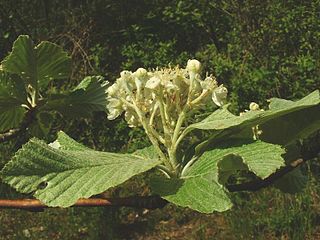
The whitebeams are members of the family Rosaceae, comprising the genus Aria. They are deciduous trees with simple or lobed leaves, arranged alternately. They are related to the rowans, and many of the endemic restricted-range apomictic microspecies of whitebeam in Europe are thought to derive from hybrids between the common whitebeam and the European rowan. Some are also thought to be hybrids with the wild service tree (Torminalis glaberrima), and the service tree of Fontainebleau found in French woodlands.

The Botanical Society of Britain and Ireland (BSBI) is a scientific society for the study of flora, plant distribution and taxonomy relating to Great Britain, Ireland, the Channel Islands and the Isle of Man. The society was founded as the Botanical Society of London in 1836, and became the Botanical Society of the British Isles, eventually changing to its current name in 2013. It includes both professional and amateur members and is the largest organisation devoted to botany in the British Isles. Its history is recounted in David Allen's book The Botanists.
The Arran whitebeams are species of whitebeam endemic to the island of Arran, Ayrshire, Scotland.
Sorbus pseudomeinichii, known as false rowan and Catacol whitebeam, is a rare tree endemic to the Isle of Arran in south west Scotland. It is believed to have arisen as a hybrid of the native rowan and the cut-leaved whitebeam which is in turn a rowan/Arran whitebeam hybrid. Until 2020 only two specimens of the Catacol whitebeam were known, at the time making it the rarest tree not only in Scotland, but joint rarest in the world with Wood's cycad, both with only one specimen living. A third was recorded as a sapling, but is believed to have been destroyed by deer. A seedling and grafted plants have also been grown in Edinburgh.
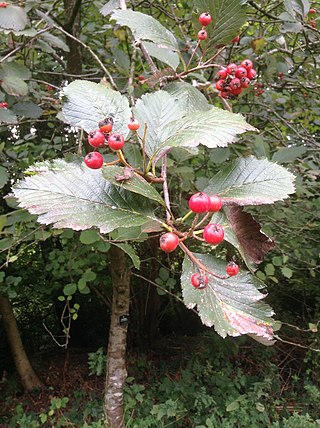
Sorbus anglica, the English whitebeam, is a species of whitebeam tree in the family Rosaceae. It is uncommonly found in Ireland and the United Kingdom, with an entire British population estimated at about 600 individuals.

Aria eminens, commonly known as the round-leaved whitebeam, is a species of plant in the family Rosaceae. It is endemic to Great Britain and is threatened by habitat loss.
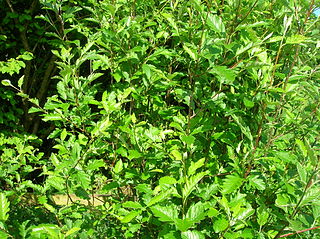
Sorbus pseudofennica is a species of plant in the family Rosaceae. Endemic to the Isle of Arran in Scotland, it is threatened by habitat loss. It is thought to be a naturally occurring hybrid between S. arranensis and S. aucuparia, probably with additional backcrossing with S. aucuparia. Sorbus arranensis is itself a hybrid between S. rupicola and S. aucuparia. Apomixis and hybridization are common in some groups of Sorbus species.
Karpatiosorbus subcuneata, the Somerset whitebeam, is a species of plant in the family Rosaceae. It is endemic to coastal north Devon and west Somerset in the United Kingdom. It is threatened by habitat loss.
Aria vexans, commonly known as bloody whitebeam, is a rare species of tree in the family Rosaceae. It is endemic to England and is found along the coast between Culbone in Somerset and an area just west of Trentishoe in Devon. It can be seen in the Exmoor National Park. It is threatened by habitat loss.
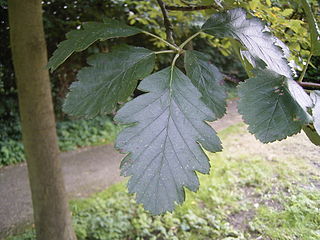
Scandosorbus intermedia or, formerly, Sorbus intermedia, the Swedish whitebeam, is a species of whitebeam found in southern Sweden, with scattered occurrences in Estonia, Latvia, easternmost Denmark (Bornholm), the far southwest of Finland, and northern Poland.

Sorbus × hybrida, the oakleaf mountain ash, Swedish service-tree or Finnish whitebeam, is a hybrid species of whitebeam native to Norway, eastern Sweden, southwestern Finland, and locally in Latvia.

Karpatiosorbus admonitor, previously classified as Sorbus admonitor and also called the no parking whitebeam, is a species of whitebeam tree found in Devon, United Kingdom. It is known only from the Watersmeet Valley at Lynton, with two stray plants growing on the coast above Sillery Sands, Countisbury.
Libby Houston is an English poet, botanist, and rock climber. The native of North London has published several collections of poetry. Houston, a research associate at the School of Biological Sciences at the University of Bristol, has discovered several new species of whitebeam (Sorbus), one of which has been given her name. In addition to membership in several organisations related to botany, Houston is a participant in the Avon Gorge & Downs Wildlife Project. She was the recipient of the H. H. Bloomer medal in 2012. The award from the Linnean Society of London acknowledged her contribution to natural history, in particular, the body of knowledge of whitebeams in Britain, and the flora of Avon Gorge in Bristol, England. In 2018, she was recipient of the Marsh Botany Award, in recognition of lifetime achievement in the field.
Karpatiosorbus houstoniae, or Houston's whitebeam, is a hybrid of two deciduous trees: the common whitebeam and the Bristol whitebeam. Only a single example of the hybrid is known to exist, at the Avon Gorge in Bristol, England. The only specimen grows on a cliff below Stokeleigh Camp at Leigh Woods in North Somerset and cannot be accessed without ropes.
Michael Charles Faraday Proctor PhD was an English botanist and plant ecologist, lecturer, scientific author based at the University of Exeter. He retired from his post as Reader in Plant Ecology at Exeter University in 1994.
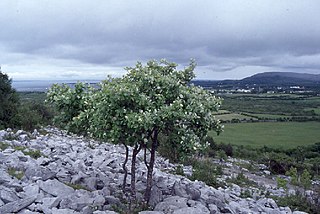
Aria hibernica, commonly known as Irish whitebeam, is a species of whitebeam endemic to Ireland. It occurs in most counties, usually as scattered individuals, or in small groups.
Aria porrigentiformis, commonly known as the grey-leafed whitebeam, is a species of whitebeam endemic to England and Wales.
Sorbus scannelliana, Scannell's whitebeam, is a species of whitebeam endemic to Ross Island near Killarney in southwest Ireland. It is one of the rarest tree species in the world; only five individual plants are known.
Aria leighensis, commonly known as Leigh Woods whitebeam, is a rare species of whitebeam, a flowering plant in the|rose family Rosaceae.









